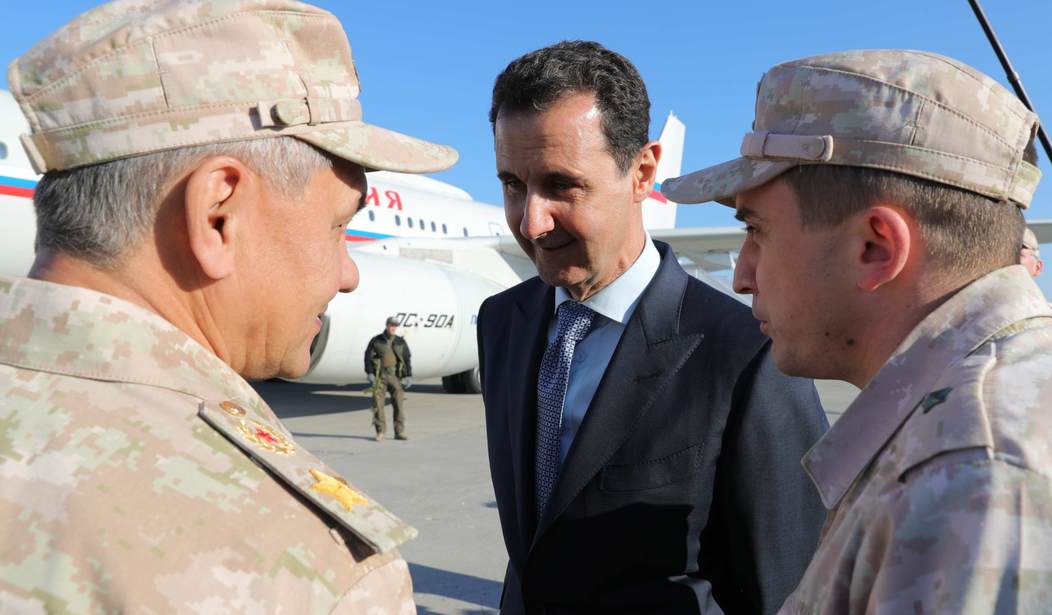ARLINGTON, Va. — A deputy commander for Operation Inherent Resolve said today that ISIS fighters are moving “with impunity” in areas held by Bashar al-Assad’s regime, but the coalition does not intend to strike at ISIS as they take haven in these regions.
At the beginning of the year, oil deals between Assad and ISIS constituted one of the largest revenue sources for the terror group, according to U.S. and European officials, even as Assad claimed his regime fought ISIS. The “millions and millions of dollars of trade,” as noted by a Treasury official in 2015, between Assad and ISIS was detected from the early days of the caliphate.
British Army Major General Felix Gedney, deputy commander for strategy and support with Combined Joint Task Force-Operation Inherent Resolve, told Pentagon reporters via video link from Baghdad today that “the fight very much continues against ISIS terrorists” as “they still present a threat to the people of Syria, as well as to the region and our home nations.”
“The Syrian Democratic Forces have, therefore, kept up their advance against ISIS in the Khabur and Middle Euphrates River Valleys. The SDF have isolated the remaining pockets of ISIS militants along the east bank of the Euphrates River and are methodically clearing areas to the east, in the desert along the border with Iraq,” he said, referring to the multi-ethnic, multi-sectarian force of Kurds, Arabs, Assyrians and other minority groups that ousted ISIS from their declared capital, Raqqa. Northern neighborhoods in Raqqa “are still uninhabitable” due to IED-clearance operations, but “conditions are improving daily in southern neighborhoods with civilians returning to core tasks of rebuilding homes, sweeping roads and even opening shops.”
ISIS is more successful in places like Damascus and Palmyra, Gedney said, as “the Syrian regime has failed to demonstrate its ability to prevent the resurgence of ISIS on their own soil.”
The general said the coalition is “seeing the movement of limited numbers of ISIS militants westwards.”
“They seem to be moving with impunity through regime-held territory, showing that the regime is clearly either unwilling or unable to defeat Daesh within their borders. We’re seeing those in and around the area of Al-Tanf, and we’re dealing with — every time we see them, we are taking those individuals off the battlefield,” he said.
However, he added, “We’ve got no intention to operate in areas that are currently held by the regime.”
Gedney wouldn’t comment on reports that Assad ally Russia is making long-term plans to put roots in Syria. He did stress that “the Russians falsely claimed victory over ISIS in Syria earlier this month” while “we, the coalition, have remained focused on ensuring the lasting defeat of ISIS in the region.” He said U.S. “deconfliction” with Russian forces to avoid mid-air collisions “is effective and it’s proving successful, and we intend to keep doing that.”
The general called on the Assad regime “to clear ISIS from those areas that are currently under their control.”
“The time for the coalition to leave Syria will be when we have defeated ISIS in the areas that we control,” he said. “Right now, we have not completed the defeat of ISIS, and it would not be the time to leave.”
“…We’ll continue to operate in areas liberated by our partner forces in Syria. And we call upon the Syrian regime to deal with ISIS in areas under their control.”
Earlier this month, Assad lashed out at the SDF as “traitors.” The SDF replied, “We assert once again that we will go forward without hesitation in chasing terrorism.”
Pressed on the potential danger of a haven for ISIS west of the Euphrates, Gedney reiterated, “The Syrian regime must be held responsible for clearing and defeating ISIS in the areas that they control. Our part in this as a coalition — we’ll continue to support our partner forces in northern Syria in the defeat of ISIS. And that includes, once we’ve liberated territory, supporting those forces that will maintain security, and particularly internal security forces or border guards, after the liberation.”
“What if [Assad forces] don’t take out ISIS? Then what? You just throw your hands up?” a reporter asked.
“Well, I think you’d have to address that to the Syrian regime,” the general replied. “We can only defeat ISIS in the areas that our partner forces control.”









Join the conversation as a VIP Member